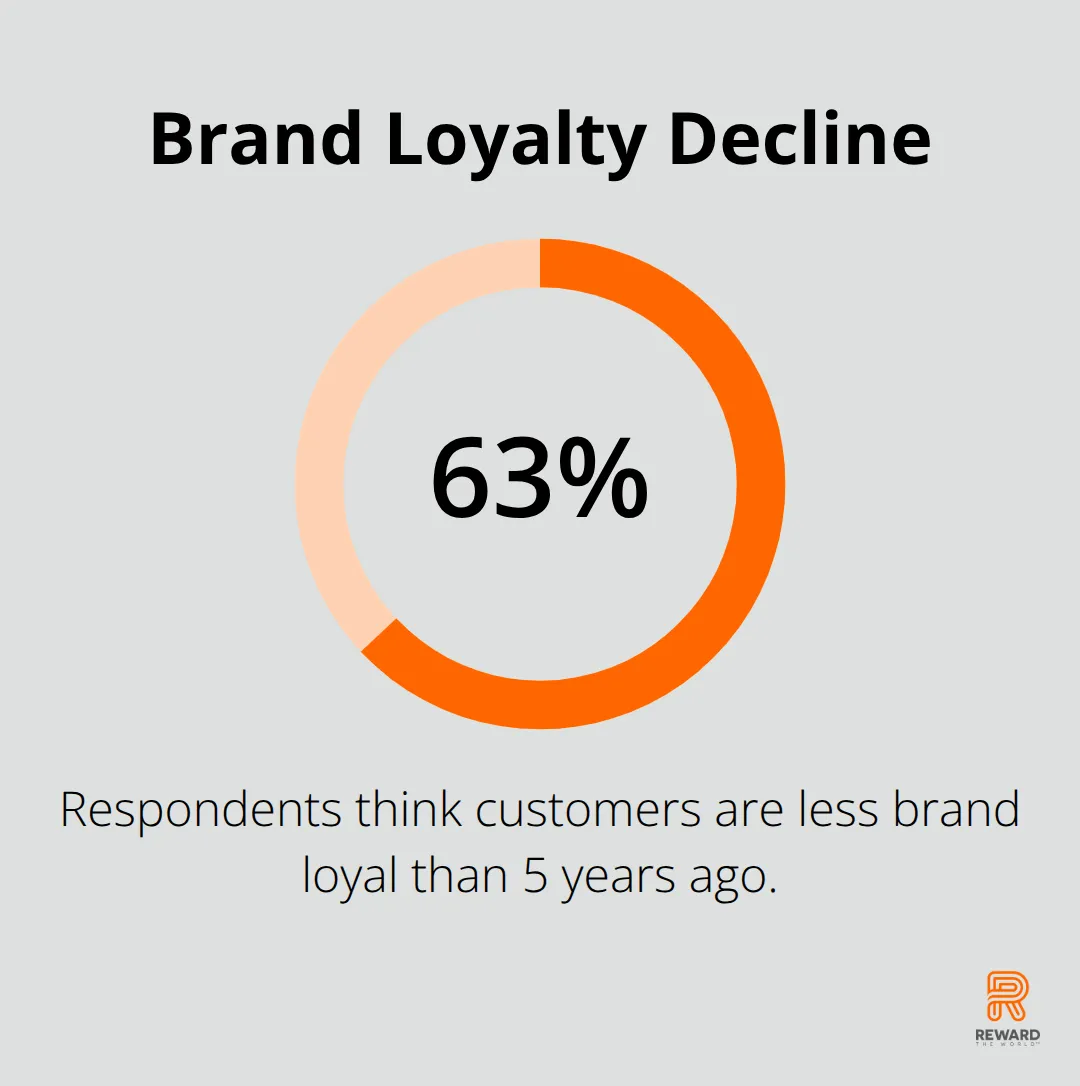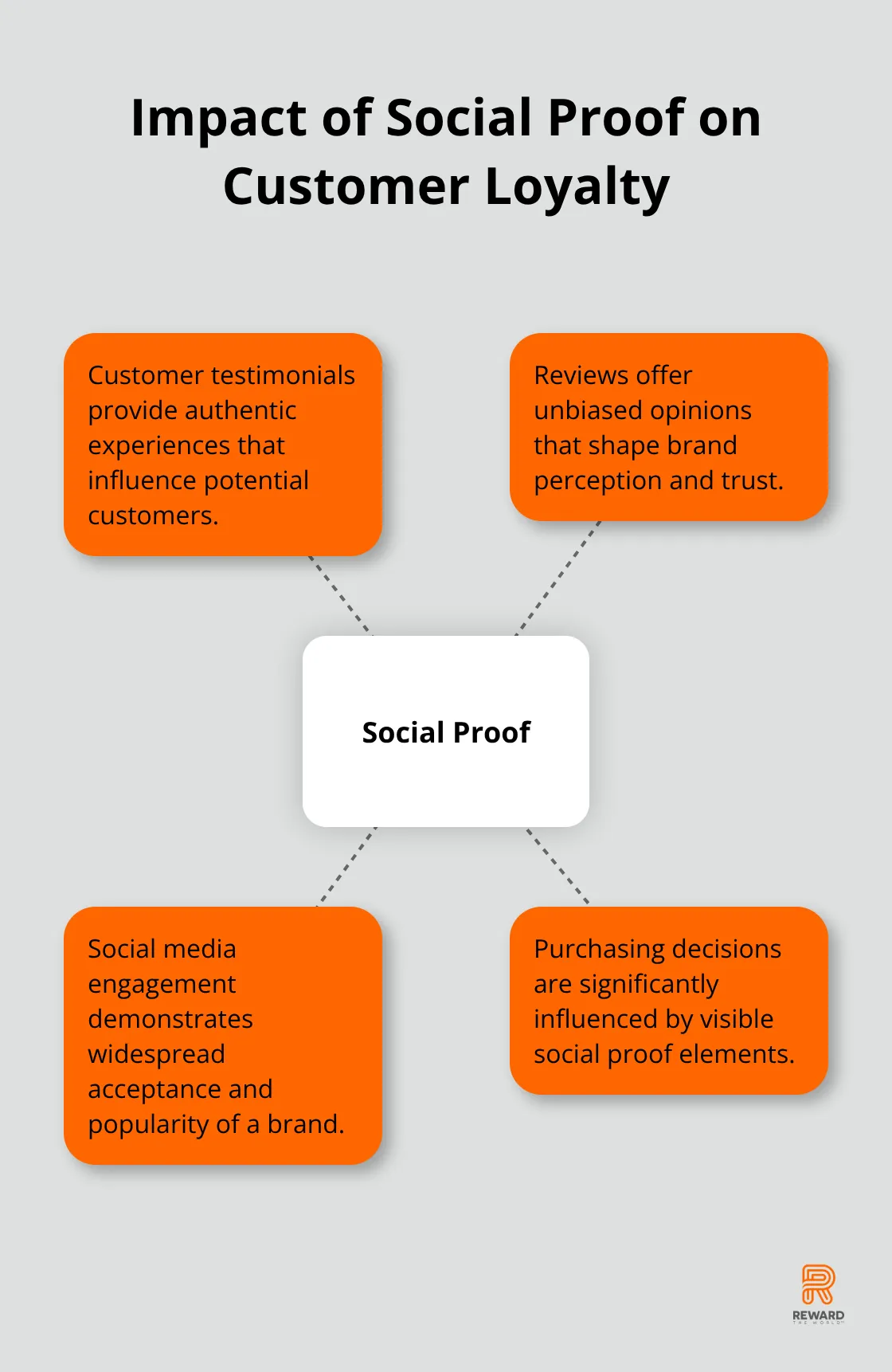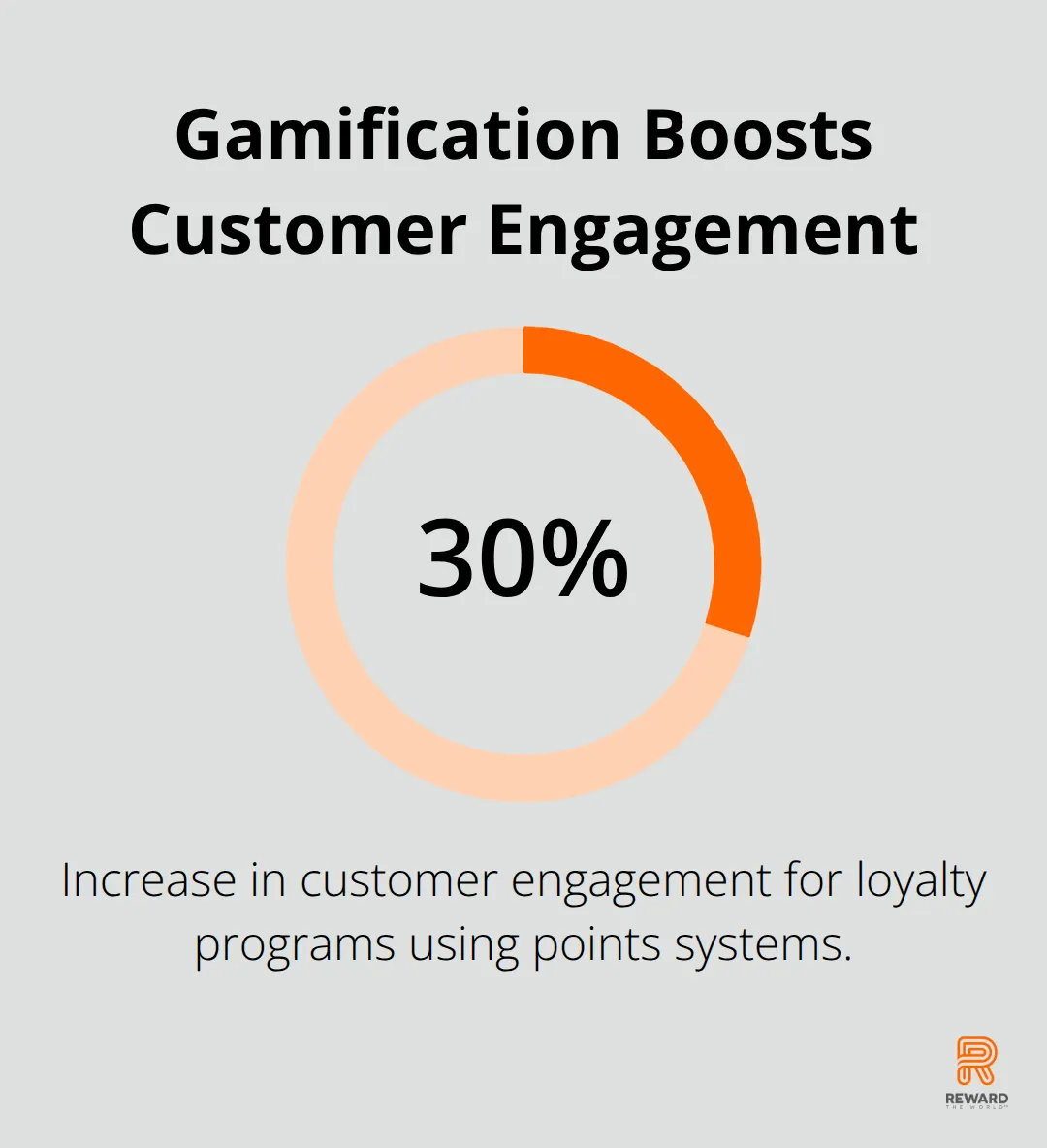
Customer psychology is the secret sauce that turns casual shoppers into loyal brand advocates. At Reward the World, we’ve seen firsthand how understanding behavioral triggers can revolutionize loyalty programs.
By tapping into the core motivations and decision-making processes of consumers, businesses can create meaningful connections that last. This blog post explores the psychological principles behind customer loyalty and how to leverage them for long-term success.
What Drives Customer Loyalty?
The Power of Emotional Connection
At Reward the World, we understand that customer psychology forms the foundation of lasting loyalty. It extends beyond offering rewards; it involves addressing the core motivations that influence human behavior.
Recent research indicates that most respondents (63.6%) think customers are less brand loyal than five years ago. This highlights the importance of understanding and addressing deeper psychological needs to foster emotional connections with customers.

Cognitive Biases in Decision Making
Our brains contain cognitive biases that influence our decisions, often subconsciously. Loyalty programs can leverage these biases, such as social proof and scarcity messaging, which have an impact on the consumer’s mindset. The endowment effect causes customers to value what they already possess, which explains the effectiveness of tiered loyalty programs.
The Role of Reciprocity
Reciprocity stands as a powerful psychological principle that can significantly boost customer loyalty. Customers feel compelled to reciprocate when they receive unexpected benefits or personalized attention. This principle can be effectively utilized in loyalty programs to increase customer engagement.
Personalization and the Self-Concept
Customers engage more with brands that reflect and enhance their self-image. This fact underscores the importance of personalization in loyalty programs. Recent statistics show that a significant share of consumers said a brand would lose their loyalty if it delivered a non-personalized experience. Tailoring rewards to individual preferences can dramatically increase program engagement.
The Impact of Social Proof
Humans, as inherently social creatures, often look to others to guide their behavior. This psychological principle, known as social proof, can serve as a powerful tool in loyalty programs. Showcasing the number of program participants or highlighting customer success stories can encourage others to join and remain loyal.
The application of these psychological principles transforms theoretical knowledge into practical strategies for creating loyalty programs that truly resonate with customers. These insights enable businesses to craft more engaging, effective, and ultimately more successful loyalty initiatives. As we move forward, we’ll explore how to implement these principles in real-world loyalty programs, turning psychological understanding into tangible results.
What Triggers Customer Loyalty?
At Reward the World, we’ve identified key psychological triggers that drive customer loyalty. These insights can transform your loyalty program from a simple points system into a powerful tool for building lasting relationships.
The Give and Take of Loyalty
Reciprocity is a powerful force in human behavior. When customers receive unexpected benefits, they feel compelled to give back. This principle can boost engagement and retention in loyalty programs.
Social proof, such as customer testimonials, reviews, and social media engagement, can act as a psychological trigger for retention. Seeing others endorse and use a product or service can significantly influence purchasing decisions, brand perception, and customer loyalty.

The Power of the Crowd
Social proof is a potent loyalty driver. People tend to follow the actions of others, especially those they trust or admire. Loyalty programs can tap into this psychology to reinforce customer commitment.
Understanding and leveraging Social Proof can significantly impact customer experience, influencing purchasing decisions, brand perception, and customer loyalty.
Creating a Sense of Exclusivity
Scarcity and exclusivity can significantly increase the perceived value of your loyalty program. When something is limited or hard to get, people want it more.
Exclusivity makes people want what they can’t have. Scarcity creates urgency, builds loyalty, and increases value. Limited-time offers can be an effective way to leverage this principle.
Personalization: The Key to Emotional Connection
Customers engage more with brands that reflect and enhance their self-image. This fact underscores the importance of personalization in loyalty programs. Try tailoring rewards to individual preferences to dramatically increase program engagement.
Effective personalization strategies include:
- Using data analytics to understand customer preferences and behaviors
- Offering customized rewards based on past purchases or interests
- Providing personalized communication and recommendations
These psychological triggers go beyond simple transactional relationships, fostering emotional connections that drive long-term loyalty and advocacy. In the next section, we’ll explore how to apply these principles in real-world loyalty programs, turning psychological understanding into tangible results.
How to Apply Psychology to Loyalty Programs
Align Rewards with Customer Values
The success of a loyalty program hinges on understanding customer motivations. This insight pushes us to move beyond generic point systems and create reward structures that resonate with our audience’s core values.
For environmentally conscious customers, we might offer eco-friendly rewards or the option to donate points to environmental causes. This approach not only increases perceived value but also strengthens the emotional connection between the brand and its customers.
Personalize the Experience
Personalization has become a necessity in today’s market. We can implement this in loyalty programs through:
- Data analytics to segment customers based on behavior, preferences, and purchase history
- Tailored rewards and communications for each segment (e.g., different reward types or adjusted communication frequency)
- A preference center where customers explicitly state their interests
Personalization extends beyond using a customer’s name in an email; it creates a unique journey for each individual.
Gamify for Greater Engagement
Gamification taps into our innate love for competition and achievement. A study by Forrester Research indicates that loyalty programs using points systems experience a 30% increase in customer engagement compared to those without. Effective gamification elements include:

- Progress bars: Show customers their proximity to the next reward (leveraging the goal gradient effect)
- Challenges and missions: Create time-bound tasks for bonus points or exclusive rewards
- Leaderboards: Foster friendly competition by displaying customer rankings
- Surprise rewards: Offer unexpected bonuses to maintain engagement and excitement
Leverage Social Proof
Social proof is a powerful tool in loyalty programs. We can use it to reinforce customer commitment by:
- Showcasing testimonials from satisfied program members
- Displaying the number of active participants in the program
- Highlighting success stories of customers who have benefited from the rewards
Create a Sense of Exclusivity
Scarcity and exclusivity can significantly increase the perceived value of a loyalty program. We can implement this through:
- Limited-time offers (creating urgency and encouraging immediate action)
- Tiered membership levels with exclusive benefits
- Invitation-only events or rewards for top-tier members
These strategies transform loyalty programs from simple point systems into experiences that address customers’ psychological needs and motivations. This approach drives engagement and fosters deeper, more meaningful connections between brands and their customers.
Final Thoughts
Customer psychology forms the foundation of successful loyalty programs. Businesses must tap into behavioral triggers and emotional motivators to create deeper connections with their customers. This approach drives long-term loyalty and advocacy, moving beyond transactional relationships to foster emotional bonds.
The future of customer loyalty depends on a profound understanding of human behavior and motivation. As technology advances, we expect more sophisticated applications of psychological principles in loyalty programs. These might include AI-driven personalization or virtual reality experiences that enhance emotional connections.
We at Reward the World help businesses harness the power of customer psychology in their loyalty initiatives. Our platform provides the tools and insights needed to create personalized, engaging loyalty programs that resonate with customers on a deeper level (and drive real results).
